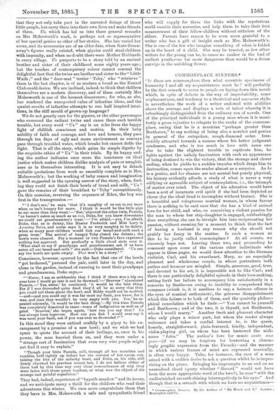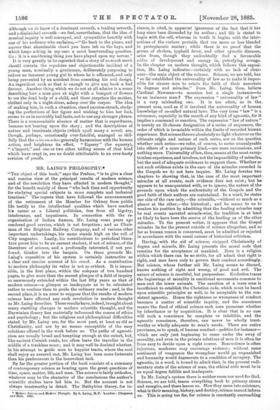COMMONPLACE SINNERS.•
IF these are commonplace, then what eccentric specimens of humanity I and all my acquaintances must be !' will probably be the first remark to occur to people on laying down this novel, which, in spite of defects in the way of improbability, some unpleasantness, and tendency to a theatrical and sensuous style, is nevertheless the work of a writer endowed with abilities above the average, and displays a vein of talent whereby it is refreshingly distinguished from the ordinary run of novels. One of the principal individuals is a young man whom it is mani- festly a gross injustice to relegate to the ranks of the common- place, seeing that he is a musician "perhaps greater than Beethoven," to say nothing of being also a novelist and genius in general of the outspoken, rough diamond order. Irre- sistibly attracted towards a woman whom his better judgment condemns, and who is too much in love with some one else to take the slightest trouble to captivate him, he fights against the unholy fascination with such an appearance of being destined to win the victory, that the strange and clever ending, when he yields to a sudden impulse which drags him to destruction, comes upon the reader almost as a surprise. As he is a genius, and her charms are not mental but purely physical, his history evidently affords a study of what is never a very edifying or agreeable subject of contemplation, i.e., the triumph of matter over mind. The object of his adoration would have been a sort of incarnate evil spirit if she had been depicted as clever (for the ideal fiend is incomplete without brains). She is a beautiful and voluptuous married woman, in whose favour there is nothing to be said save that she has a kind of animal love for her child, and who, on conceiving a violent passion for the man to whom her step-daughter is engaged, unblushingly does everything she can to inveigle him into reciprocating her passion, without seeming for a moment to think that the fact of having a husband is any reason why she should not gratify her fancy in the matter. Is such a woman as this to be justly called commonplace P At all events, we sincerely hope not. Leaving these two, and proceeding to comment upon some of the various other individuals who appear in these pages, we would draw attention to the German violinist, Carl, and his sweetheart, Mary, as an especially pleasant and wholesome couple, in whose portraiture both pathos and humour are mingled. Simple, generous, good, true, and devoted to his art, it is impossible not to like Carl ; and there is one particularly delightful episode in their love-making, setting forth her failure to accompany him satisfactorily in a concerto by Beethoven owing to inability to comprehend that composer (which is, it is needless to say, a heinous offence in the eyes of musical enthusiasts;, the grievous disappointment which this failure is to both of them, and the quaintly philoso- phical consolation which he finds :—" You cannot be yourself and Beethoven ; and of the two, it is thyself, not Beethoven, whom I would marry." Another fresh and pleasant character who only plays a minor part, but whom the reader always welcomes and takes a cordial interest in, is the queer, homely, straightforward, plain-featured, kindly, independent, violin-playing girl, on whom has been bestowed the nick- name "John." The author's love for music saute aux yeu.s—(if we may be forgiven for borrowing a charm- ingly graphic expression from the French)—and the manner in which various frames of mind are expressed musically, is often very happy. Take, for instance, the case of a man seized with a sudden desire to ask a question whilst he is impro- vising on the piano. Bringing his impromptu to an end on an
unresolved chord (query whether " discord " would not have been the more appropriate word of the two ?), he rose" with the undiminished seventh shining interrogatively in his eyes." And though that is a seventh with which we have no acquaintance-
• Commonplace Sinner,. By the Author of " My Heart and I." London : Remington and Co.
although we do know of a dominant seventh, a leading seventh, and a diminished seventh—we feel, nevertheless, that the idea of musical inquiry is well conveyed, and sympathise heartily with one of his audience who exclaims,—" Go back to the piano, and answer that abominable chord you have left on the keys, and which keeps asking in my ears a most heartrending question. Go ; it is a maddening thing you have played upon my nerves."
It is very greatly to be regretted that a story of so much merit should contain the repulsive and objectionable incident of a young man, nominally a gentleman, deliberately purposing to seduce an innocent young girl to whom he is affianced, and only being prevented by an accident from executing his evil design. An ingredient such as that is enough to give any book a bad flavour. Another thing which we do not at all admire is a scene describing how a man goes at night with a bouquet of flowers to see the dead body of a child, and there surprises the mother, clothed only in a night-dress, asleep over the corpse. The idea of making him, in such a situation, stand passion-struck, study- ing the perfections of her figure and wishing to kiss her foot, seems to us in execrably bad taste, not to use any stronger phrase. There is a commendable absence of matter that is superfluous, because not bearing upon the story ; and the descriptions of nature and inanimate objects (which spoil many a novel) are, though, perhaps, occasionally over-fanciful, managed so skil- fully that the anise-en-86 n,e generally harmonises with the human action, and heightens its effect. " Equery " (for equerry), " n'import," and one or two other trifling errors of that kind which have crept in, are no doubt attributable to an over-hasty revision of proofs.



































 Previous page
Previous page